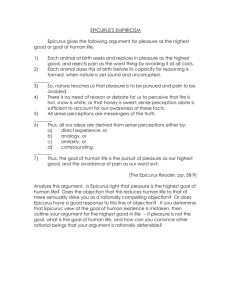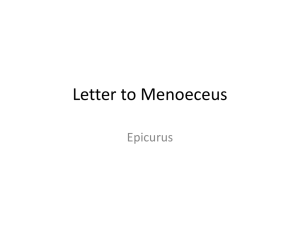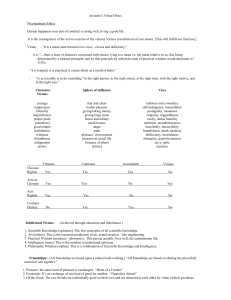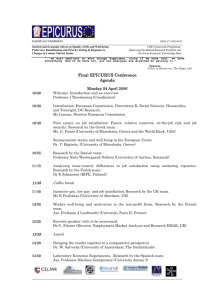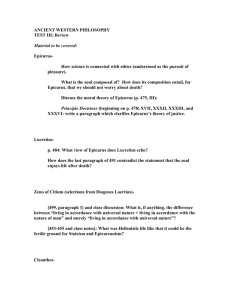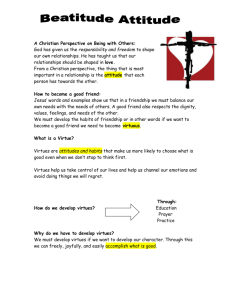The Moral Virtues and Instrumentalism in Epicurus
advertisement
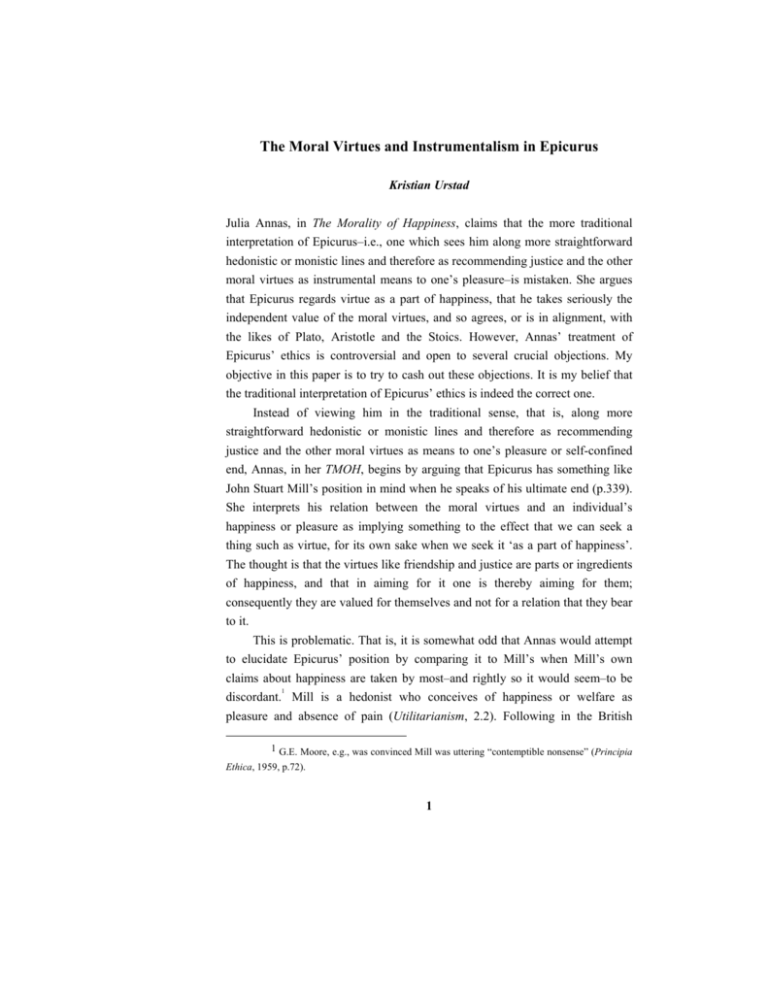
The Moral Virtues and Instrumentalism in Epicurus Kristian Urstad Julia Annas, in The Morality of Happiness, claims that the more traditional interpretation of Epicurus–i.e., one which sees him along more straightforward hedonistic or monistic lines and therefore as recommending justice and the other moral virtues as instrumental means to one’s pleasure–is mistaken. She argues that Epicurus regards virtue as a part of happiness, that he takes seriously the independent value of the moral virtues, and so agrees, or is in alignment, with the likes of Plato, Aristotle and the Stoics. However, Annas’ treatment of Epicurus’ ethics is controversial and open to several crucial objections. My objective in this paper is to try to cash out these objections. It is my belief that the traditional interpretation of Epicurus’ ethics is indeed the correct one. Instead of viewing him in the traditional sense, that is, along more straightforward hedonistic or monistic lines and therefore as recommending justice and the other moral virtues as means to one’s pleasure or self-confined end, Annas, in her TMOH, begins by arguing that Epicurus has something like John Stuart Mill’s position in mind when he speaks of his ultimate end (p.339). She interprets his relation between the moral virtues and an individual’s happiness or pleasure as implying something to the effect that we can seek a thing such as virtue, for its own sake when we seek it ‘as a part of happiness’. The thought is that the virtues like friendship and justice are parts or ingredients of happiness, and that in aiming for it one is thereby aiming for them; consequently they are valued for themselves and not for a relation that they bear to it. This is problematic. That is, it is somewhat odd that Annas would attempt to elucidate Epicurus’ position by comparing it to Mill’s when Mill’s own claims about happiness are taken by most–and rightly so it would seem–to be 1 discordant. Mill is a hedonist who conceives of happiness or welfare as pleasure and absence of pain (Utilitarianism, 2.2). Following in the British 1 G.E. Moore, e.g., was convinced Mill was uttering “contemptible nonsense” (Principia Ethica, 1959, p.72). 1 The Moral Virtues and Instrumentalism in Epicurus utilitarian, empiricist tradition of Bentham, happiness, for Mill, in its starting point, is plainly concerned with the maximization of the feeling of pleasure and the minimization of the feeling of pain. However, when Mill goes on to speak more in detail about the substantive content of happiness, he appears to trade on the ambiguity in English between pleasure and a pleasure. That is, between pleasure as a feeling or experiential state–as was standard in the utilitarian 2 tradition –and the pleasure-source or activity; for instance, between saying something like reading produces or gives you pleasure or that reading is a pleasure of yours. This apparent equivocation on ‘pleasure’ enables Mill to speak of certain states or activities, such as music, health and virtue, as pleasures. This, in turn, allows him to call these sorts of activities ends in themselves, as integral parts of happiness. But if the ultimate goal of happiness is a feeling of pleasure it cannot also be a composite of states and activities that are sources of this pleasure. The only value activities connected to happiness as construed in this way, i.e., as a feeling of pleasure, can have is a causal or instrumental one. Mill, it would seem, is not entitled to have it both ways. Either he is a hedonist in the way he starts out, i.e., where happiness as pleasure is some distinct and self-confined psychic state, and where therefore activities like the virtues are viewed as merely instruments for its acquisition, or he is some sort of non-hedonist pluralist concerning happiness, perhaps in the Aristotelian vain, and attaches to activities like the virtues a value that is independent of their bringing about some enjoyable state of oneself. In any case, if Mill’s position is open to this incoherence, then an appeal to his conception of happiness on Annas’ part does not show that Epicurus can consistently hold the position that 3 she ascribes to him. To put it somewhat differently: Although Annas maintains throughout that Epicurus’ position is a hedonistic one (e.g. p.334), she appeals to the workings of Mill’s position to show how it is that Epicurus makes his ultimate end emerge 2 Bentham, for example, calls pleasures and pains ‘interesting perceptions’, An Introduction to the Principles of Morals and Legislation, 5.1. 3 See Irwin, 1994. 2 LYCEUM as somewhat more plural, comprising, among other things, the virtues such as justice. Yet, it is clear to most that Mill himself is not entitled to such a move if he is to retain his initial hedonism which says, not unlike Epicurus, that happiness just is the feeling of pleasure and absence of pain. Appealing specifically to Mill therefore, does not, at least in any outright convincing way, show how it is Epicurus can be a hedonist and yet be aligned with the other ancient theorists in holding to the independent value of the virtues. A further problem, as it seems to me, is the extent to which Annas might be seen to exaggerate the similarities between Epicurus and Mill in regards to the completeness of their final end (happiness is complete, we remember from Aristotle, in so far as it achieves all that we want –EN 1097b20-21, EE 1215b17-18). Annas appeals to the position of Mill, which she likens in many of the relevant ways to Epicurus’, in order to better make us see just how much Epicurus thinks virtue must be a part of the happy life, lest it be deemed incomplete (e.g. 236ff). However, judging from Chapter IV of his Utilitarianism, it is difficult not to see Mill as being far more worried about, or conservative with respect to, showing how pleasure or happiness could be our all-encompassing good (that it includes, among various other goods, the virtues) than Epicurus ever does. For instance, in that chapter Mill states that “the ingredients of happiness are very various” (italics added); some of the ingredients he mentions are money, power, fame, health, music, and, of course, virtue. He also says that “life would be a poor thing” if it did not contain all such “sources of happiness”, and that they are valuable in part with respect to the “space of human existence that they are capable of covering”. This sounds very much like someone intent on showing that the final end conceived of as pleasure or happiness has to be such as to incorporate or include what is commonly taken to be all, or many, of our worthwhile aims; the final end in life needs to allow in commitments to virtue and all sorts of other goods. But apart from perhaps a small passage in his Letter to Menoeceus (1 32), nowhere is it made as explicit or stressed as severely in Epicurus as it is in Mill that the final good has to be such as to accommodate all other aims, most importantly, the 3 The Moral Virtues and Instrumentalism in Epicurus virtues, as part of it. This is a further sign, I think, not that Epicurus is not concerned with completeness –far from it (e.g. Cicero, Fin I 29), but rather, as pointed out above, that he holds more determinably to a monistic and selfconfined final end than does Mill. That is, Mill thinks of completeness of happiness as covering a great range of necessary goods and activities presumably because, coherently or not, he conceives of pleasure or happiness as having many parts. Epicurus takes the completeness of happiness in a different sense because for him what seems to matter is only the state of pleasure or ataraxia that results –the goods or activities are not as indispensable to those results as they are in Mill. What appears to matter for Epicurus is not so much the things we have or do, or whether our life is cut short (Cicero, Fin II 87-8; KD 19, 20), but rather the condition of being untroubled, and this makes more sense if we see him as not holding a part or component view of happiness, but rather, a view of happiness as an entirely self-confined state of mind. This last point, Epicurus’ apparent thesis that pleasure, the final end in life (if achieved), does not make a longer life any better than a shorter life, is, it seems to me, particularly revealing in this regard. The idea here seems to be that if I can achieve ataraxia now, at a young age, then I will have no reason to desire to live until old age rather than to die now; and this is because if I am already happy now, more time cannot give me anything I do not now already have. But one might wonder how pleasure construed in this way and fit to be our final end is meant to be such as to fully include the exercise and demands of the moral virtues, or, for that matter, many of life’s other goods, as we find in Mill. We usually think of the other-regarding virtues as committing us to the kind of concern for others which extends far into the future; similarly, we normally think of many of life’s other goods as long-term projects to be fulfilled. But what real sense can be made of such commitments if living a life free of irritation, trouble and disturbance is good, without being made better, if this life, along with those commitments, is cut short? Again, this is not to suggest that Epicurus is not concerned with the notion of completeness. It is 4 LYCEUM only to say that he has drastically shifted the application of completeness because he presumably holds a particular self-confined and monistic final end. But Annas is not dependent solely on an appeal to Mill in order to encourage an interpretation of Epicurus as someone who regards virtue as a part of happiness. She also focuses heavily on his conception of pleasure as the final end in order to do so. At first (p.334-35) Annas says that since Epicurus’ final end is not kinetic pleasure but katastematic, ultimately, the pleasures of ataraxia and aponia, –and hence not amendable to quantitative measurement, Epicurus cannot be any sort of maximizing hedonist. So far this seems undoubtedly right. Epicurus is, it seems to me, clearly unconcerned with any sort of project where one pursues those pleasures which will yield higher degrees of intensity and are of longer duration. Invoking anything like Bentham’s style of measurement 4 therefore, does not really fit what Epicurus has to say. But then Annas goes on to state that because Epicurus’ theory is not one in which rationality takes the form of this sort of maximizing it cannot be that he takes the virtues or any actions aiming at pleasure to be merely instrumental or interchangeable means (p.334). The thought is, in other words, that because Epicurus’ theory is not really consequentialist in nature where the ethical goal amounts to the production of the greatest state of affairs or is not such as to tell us that the right thing to do is calculate what will maximize pleasure in each action, but is instead more of an attempt to transform pleasure into a candidate for eudaimonia, it cannot be of the sort whereby the virtues are construed instrumentally. This seems to be somewhat of a puzzling claim. Of course it may be true that because of this Epicurus cannot be an instrumentalist about the virtues in this particular way, i.e. in the more modern consequentialist way, as she puts it, but this suggests nothing to rule out the possibility that he may be committed to being an instrumentalist about the virtues in other ways or for other reasons, even though he is faithful to important features of eudaimonism. 4 Though, for some further discussion on Epicurus and quantitative calculation see, Warren, “Epicurus and the Pleasures of the Future”, 2001. N. White, 2002, p. 302ff. 5 The Moral Virtues and Instrumentalism in Epicurus In any case, Annas drops her emphasis on maximizing and goes on in considerable length to defend Epicurus from the charge of instrumentality by appealing to the kind of state the final end of ataraxia is. Her contention here seems to be that the nature of ataraxia as happiness is such that it can accommodate the virtues as a part of it. She apparently thinks that this description of happiness, i.e. as ataraxia, is such that it removes those difficulties raised by kinetic hedonism, or the hedonism of Mill, i.e. happiness as a state of pleasure and absence of pain. She describes this ‘unique’ and ‘expansive’ end (p.239) as, “being in a condition in which bodily and mental pleasures of satisfying our needs result in a state of satisfaction…” (p.337), and as a “state where…you are not hindered or upset by mental or bodily troubles.” (p.338) But we might wonder how exactly this description is supposed to do the job Annas wants it to? Being virtuous, for example, does not seem to be the same thing as being in a state of freedom from mental or bodily troubles. This state of ataraxia, though it may not be the more positive sense of pleasure as traditionally defined, is nevertheless some sort of psychological state of oneself that is self-confined, namely, one’s own feeling of untroubledness or tranquillity. It is difficult to see how Epicurus could be thinking that the virtues are either identical with, or parts of, this type of state. Epicurus may believe that such a state ensues on being virtuous or that ataraxia is the untroubled state that one achieves by being virtuous, but this is not to say that the virtues and virtuous actions themselves are what ataraxia is. Even if he insists that optimal ataraxia requires the exercise of the virtues, this does nothing to establish that the virtues are chosen for their own sake, and not as strictly instrumental.5 Sometimes Annas seems to be insinuating that ataraxia is not some sort of psychological state at all but a kind of condition of activity or functioning. For instance, she describes it as, “the condition of normal functioning unimpeded…” or as, “doing whatever we are doing in a way which is not hindered…” (p.33738, italics added) Strictly speaking, since it makes no reference whatsoever to experiential states or states of consciousness or perception, this would not be 5 See Irwin, 1994. 6 LYCEUM any kind of recognizable hedonism, This, it seems, would be stretching Epicurus’ position beyond anything we find in the testimony. After all, his hedonism has some pretence to be empiricist (Cic. Fin. i. 30) and to begin from some point of common sense (Cic. Tusc. Disp. 3.41-2). In any case, even under such a description it does not seem that Annas (if indeed she sees it this way) will get the result she wants. That is, it is hard to see how virtuous actions could ever be made identical with, or a part of, the final end of unimpeded functioning. It seems that the demands of virtue would often prove to be such as to interfere, not acquiesce, with normal untrammelled activity. However, even if this were (somewhat bizarrely perhaps) not the case, and instead virtuous action always resulted in unimpeded functioning, this still does not show that such action is chosen for its own sake, as part of that end. Nonetheless, Annas moves forward to the texts and points out three characterizations of the relation between virtue and pleasure which she believes counts against the view that virtue, according to Epicurus, is valuable only insofar as it results in pleasure (as he conceives it). They run as follows. “Epicurus describes virtue as the sine qua non of pleasure, i.e. the one thing without which pleasure cannot be, everything else, food, for instance, being separable, i.e. not indispensable to pleasure.” (DL X 138) “Therefore prudence is even more precious than philosophy, and it is the natural source of all the remaining virtues: it teaches the impossibility of living pleasurably without living prudently, honorably and justly, [and the impossibility of living prudently, honorably and justly] without living pleasurably.” (Ep Men 132) -which continues, 7 The Moral Virtues and Instrumentalism in Epicurus “For the virtues are naturally linked (sumpephukasi) with living pleasurably, and living pleasurably is inseparable from them.” (Ep Men 132) Before moving on to a closer analysis, it might perhaps be seen as significant that Annas, in an attempt to cast doubt on the traditional interpretation that Epicurus gives the virtues merely instrumental status, can only bring to the fore two passages in the whole of the Epicurean literature which she thinks are able to do this. There are, first of all, numerous other passages, attributed to Epicurus (and to Epicureans in general) which clearly, and somewhat viciously, debunk the virtues, if they do not contribute to pleasure (for instance, Cic. Tus. Disp. 3.42, Cic. On ends 2.69). In these passages it appears unmistakable that Epicurus is unwilling to adapt his hedonism to fit the sort of belief about virtue Annas wants to assign to him and likens to the other ancient moralists. But even if we chalk these up as overlyhostile or ripped out of context –as Annas notably does (p.341), there are what seem like an endless amount of other passages which, though perhaps not as iconoclastic and vehement as those in the first group, are just as forthright and clear about a systematic view that strives for a single, monistic measure to be used in deliberation. There is no other consideration for a reasonable person to deliberate over, outside of aiming at pleasure in the sense of ataraxia, or one’s own tranquillity –everything else derives value from that (e.g. Ep Men 127, Kyriai Doxai 25, Cicero On ends, I. 29). One might wonder then why Annas would think that the enormous bulk of this evidence can be overturned or somehow tempered by only two passages suggesting (according to her) the attachment of some intrinsic value to moral virtue. That said, let us now take a look at Annas’ reading of these two aforementioned passages, and see if she is right in thinking that they provide clear evidence that Epicurus regards the virtues as a part of happiness. Annas presents two interpretations of the Diogenes passage. The first says that one may get pleasure from food or fail to do so but one cannot fail to get pleasure from virtue, while the second says that food is only one among many ways to get 8 LYCEUM pleasure, whereas virtue is unavoidable as a way of getting pleasure (p.340). While it is not quite apparent what status she assigns to food in its relation to pleasure, it seems clear, from both interpretations, that she thinks virtue to be a necessary condition for pleasure. In his Letter to Menoeceus, Epicurus, in abridged form, says that it is impossible to live pleasantly without living justly and impossible to live justly without living pleasantly. Annas’ interpretation here is that one cannot fail to live pleasantly if one has the virtues (as one could if one has food) since having the virtues entails living pleasantly and, further, that having the virtues is unavoidable as part of living pleasantly, not just one among alternative means to it, since living pleasantly entails having the virtues (p.341). The first clause suggests that she thinks that the virtues are sufficient for living pleasantly, while the second suggests that she thinks that they are necessary. And finally, Annas appears to take the third quoted text to count as the best evidence for her view. She is able to count it as her best evidence because she translates sumpephukasi as ‘grown to be part of’ (p.341). By translating it in this way, she makes it easier to incorporate or import the claim that happiness has virtue as a part of it, or that the two are somehow conceptually inseparable. Now, putting aside for a moment the sumpephukasi line, Annas seems to suppose that the conditions suggested are enough to show that Epicurus gives the virtues a non-instrumental role in the pleasant life. However, the claim that virtue is necessary and sufficient for the pleasant life is not enough to provide this evidence, since this claim can be made consistent with an entirely instrumentalist status for virtue. It can be made consistent if we interpret Epicurus to be making the necessity claim an empirical one. That is, we might read Epicurus to be saying that, as a matter of empirical fact, virtuous action results in a more pleasant life overall, understood as one with less trouble and disturbance, than results from any alternative course of action. There is good reason to suppose that Epicurus is indeed making this sort of empirical claim in the aforesaid Menoeceus passage, since directly preceding it, in an explanation of what it is that yields an untroubled soul, he says, “sober reasoning which 9 The Moral Virtues and Instrumentalism in Epicurus tracks down (exeurisko) the causes (aitia) of every choice and avoidance” (132). Here, Epicurus seems to be saying that in order to identify the acceptable or choiceworthy and unacceptable or unchoiceworthy pleasures, one must know a great deal about what causes people to enjoy themselves and to suffer. In other words, what produces the pleasant life looks to be a kind of knowledge, in the form of discovery, about what causes what in the world and in the realm of human experience. The ideal Epicurean will have what amounts to a clear and comprehensive understanding of the various causal relationships between objects of pursuit and avoidance and subsequent effects. It would make sense then to understand the subsequent ‘virtue is unavoidable as part of living pleasantly’ bit as indicative of a claim about empirical necessity. Something very similar can be said about the Diogenes passage, especially so if we consider it alongside the passage which directly precedes it and which opens the section. This says, “And we choose the virtues too on account of pleasure and not for their own sake, as we take medicine for the sake of health.” 6 (X 138) This indubitably assigns instrumental status to the virtues. It is so forthright that we cannot ignore this in our reading of the immediately ensuing virtue passage. This is not to say that we should not take ‘virtue as the sine qua non of the pleasant life’ seriously, it is rather, it would seem, that we are obliged to do so in a way which makes it compatible with the opening instrumentalist claim. The ‘medicine for the sake of health’ analogy can be seen to shed some light on this compatibility. That is, it is through experience that there is seen to be some reliable and general connection between a certain sort of treatment or medicine and the result of alleviating sickness or improving health. Thus we might view the virtue passage as making the same kind of empirical point. One goes out and discovers that, unlike food, which does not always yield pleasure, the way the world happens to be is such that being virtuous is the one thing without which pleasure will not arise. This reading makes sense of both passages considered alongside each other. I take this to be an advantage over 6 Cf. Plato, Rep. ‘third class of good’ at 357c4-6. 10 LYCEUM Annas’, who takes no account whatsoever of the instrumentalist claim in her 7 interpretation of its neighboring virtue passage. Now, the point here is not necessarily to argue for an interpretation of Epicurus which makes the virtues necessary for happiness –since, as mentioned, the bulk of the evidence would seem to count against this –rather, it is to show that even if we follow Annas in these particular passages and take seriously these necessity claims, they will best be understood empirically –and that from this, it simply does not show that virtue, according to Epicurus, is to be chosen for its own sake and not simply as instrumental to happiness. There is something more to notice about the ‘medicine for the sake of health’ claim. Through his analogy with medicine and health, Epicurus indicates that he conceives of virtue and pleasure as two separable and distinct notions. Now Annas says that Epicurus means virtue and pleasure to be ‘mutually entailing’ (p.340), which she takes the sumpephukasi line to be indicating. To take this at face value would mean that Annas thinks that Epicurus takes the concepts of virtue and pleasure to be in some sense derivable from one another. But Epicurus’ comparison of virtue and pleasure with medicine and health shows that such a mutual entailment cannot be the case. It is clear that in principal the concepts of medicine and health are wholly extricable from, and 7 Annas does briefly mention the ‘medicine for the sake of health’ text, but chalks it up as one of those iconoclastic passages ripped out of context and coming from overly-hostile sources, or, if taken more seriously, as one “designed merely to make the point that virtue is not our final good, without being supposed to give a full account of the relationship of virtue to pleasure.” (341) But to say this of this particular passage seems highly dubious. First of all, Diogenes was an Epicurean, whose biographical account here is largely dominated by a desire to refute those authors who attempt to defame Epicurus. The very fact that he does include this passage in his account should testify to its importance and legitimacy. Second, for Annas to attribute to this passage the vagueness she does seems somewhat disingenuous, since it clearly does give an account of the relationship of virtue to pleasure. Elsewhere (2003, 81), Annas claims that Mill uses exactly the same analogy ‘evidently thinking it consistent with what he says about virtue and pleasure’. I find this difficult to accept for the reason that when Mill employs the medicine-health analogy he does so in Chapter I of his Utilitarianism and in such a way which suggests he is only concerned with elucidating the formal structure of ultimate ends and means, not with any specific relation between them. 11 The Moral Virtues and Instrumentalism in Epicurus independent of, one another; there is nothing about health as a concept which entails the concept of medicine as a part of it, and vice versa. Likewise should we be wary, following the comparison, of any conceptual necessity between virtue and pleasure. There is nothing, that is, in the concept of ataraxia, as a self-confined psychological state, which is linked by analytic necessity to the concept of virtue, and again vice versa. It is for this reason that we should be distrustful of Annas’ translation of sumpephukasi. That the virtues have, according to her, ‘grown to be part of’ pleasure suggests some sort of conceptual closeness or inseparability which does not, upon closer analyses of these other passages, seem to be there. Long and Sedley, in their The Hellenistic philosophers and Inwood and Gerson, in their The Epicurus Reader, translate this passage as “…the virtues are naturally linked with living pleasurably…” and “…the virtues are natural adjuncts of the pleasant life…” respectively (italics added). These translations seem closer to the mark, as they fit perfectly with our above examination of the two other selected passages. That is, the suggested closeness between virtue and pleasure is best viewed not as a conceptual one, but as a natural and empirical one. And this, once again, simply does not show that Epicurus is not an instrumentalist about the virtues. It turns out then that Annas’ construal of Epicurus’ position is difficult to square with the literature, even with those (very few) passages she herself thinks strongly support her case. This might lead us to think that Annas exacerbates the extent of the agreement among ancient moralists about the relation of virtue to happiness.8 That is, it is hard to see Epicurus, who is undeniably a major figure in ancient ethics9, as someone who thinks virtue is to be chosen for its own sake as part of happiness, as Aristotle and, perhaps, Plato do. 8 See Irwin, 1994, Sect. VII, for a discussion about the extent of this agreement amongst ancient moralists. 9 Diogenes reports that Epicurus eclipsed all before him in the number of his writings (X 26). 12 LYCEUM University of the Fraser Valley British Columbia, Canada 13 The Moral Virtues and Instrumentalism in Epicurus Bibliography Annas, J. 1993. The Morality of Happiness. New York, New York: Oxford University Press. Bentham, J. 1907. Principles of Morals and Legislation. Oxford: Clarendon Press. Irwin, T. 1994. “Happiness, Virtue and Morality”. Ethics. Vol. 105. No. 1. 153177. Long, A. A. and Sedley, D. The Hellenistic Philosophers. Vol. 1, 2. Cambridge: Cambridge University Press. Warren, J. 2001. “Epicurus and the pleasures of the future”. Oxford Studies in Ancient Philosophy. 21. 135-79. White, N. 2002. Individual and Conflict in Greek Ethics. Oxford: Clarendon Press. 14
